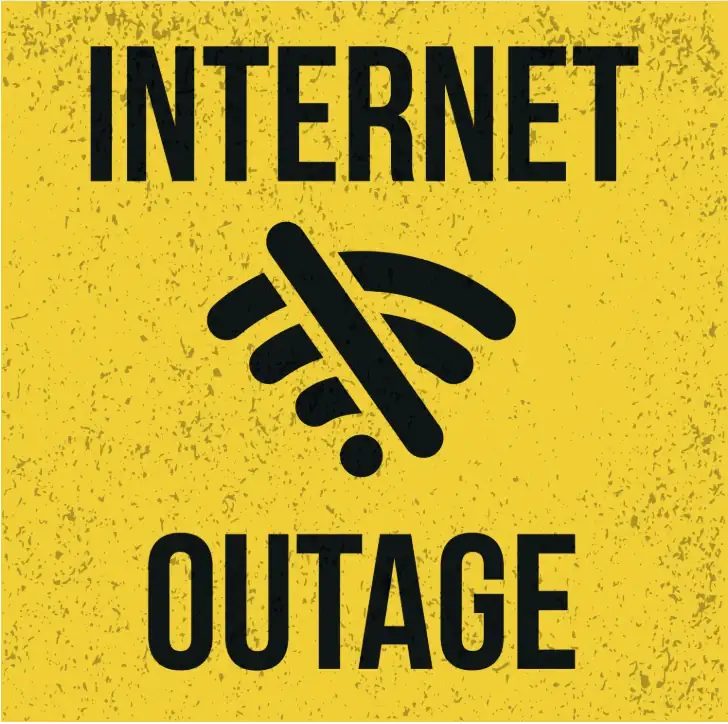Bitcoin has grown as a popular digital currency operating on a decentralized network, allowing users to conduct transactions without intermediaries like banks. However, the question arises, what happens to Bitcoin if the Internet goes down? Although it may seem like a hypothetical scenario, it is a legitimate concern, especially with the increasing dependency on the Internet for daily activities. In this article we will discuss the potential outcomes if the Internet goes down and Bitcoin's fate in such a scenario. While some may argue that a temporary internet outage would not significantly impact Bitcoin, others believe prolonged downtime could result in a catastrophic loss of value and trust in the cryptocurrency. Ultimately, the impact of an internet outage on Bitcoin will depend on the duration of the outage and the ability of the Bitcoin network to recover from such an event.
Bitcoin and Its Dependence on the Internet
Running on a decentralized model, Bitcoin is a digital currency that has revolutionized how we think about money. In contrast to traditional currencies, Bitcoin is not backed by any government or financial institution. Instead, it operates on a peer-to-peer network and is recorded on a blockchain public ledger. While Bitcoin has many advantages, one of its main drawbacks is its dependence on the Internet. The Internet is the backbone of Bitcoin; without it, the currency would not exist. All BTC transactions are conducted online, and the currency relies on a robust internet connection to function correctly. If the Internet were to go down functionally, the ability to transact with Bitcoin would be severely limited. One of the main reasons why Bitcoin depends on the Internet is the way transactions are validated. Miners validate transactions through a proof-of-work process, which requires significant computational power. This computational power is provided by a network of computers connected to the Internet. With no access to a reliable internet connection, it would be impossible to validate transactions and ensure the integrity of the blockchain. Another reason Bitcoin depends on the Internet is the need for private keys to ensure transaction security. Private keys are utilized to sign transactions and prove ownership of Bitcoin. Unfortunately, hackers could easily intercept private keys and steal Bitcoins without a secure internet connection. Despite its dependence on the Internet, Bitcoin has proven to be a reliable and secure currency. The blockchain ensures the integrity of transactions and prevents any single group or individual from controlling it. However, the Internet is not infallible, and there remains the risk of a cyber-attack or a natural disaster that could disrupt Internet connectivity. Bitcoin is a revolutionary currency that has changed how we think about money. However, its dependence on the Internet is a significant drawback. While the Internet has been proven a reliable and secure platform for Bitcoin transactions, there is always the risk of a disruption in connectivity. As the world becomes even more conditional on the Internet, finding ways to ensure the continued reliability and security of Bitcoin and other online currencies is essential.

What Could Make the Internet Go Down?
As scary as the Internet going down sounds, it becomes much easier to calmly comprehend the risks when you understand precisely how such a situation could happen. Here is a selection of the factors and events that could lead to the Internet going down:
Cyber Attacks:
Cyber-attacks can be one of the most significant threats to the Internet. A single attack can take down entire networks and cause massive disruptions. In addition, hackers can use various methods like DDoS attacks, phishing, and malware attacks, which can compromise the security of the Internet.
Natural Disasters:
Natural disasters like earthquakes, hurricanes, and floods can cause significant damage to the infrastructure that supports the Internet. These disasters can damage cables and servers, which can take a long time to repair, leading to prolonged internet outages. What happens to Bitcoin if the Internet goes down in an extreme natural disaster is a point of much speculation.
Power Outages:
The Internet infrastructure requires a constant supply of electricity to run. Power outages can interrupt the flow of electricity, leading to the shutdown of servers and other critical equipment that support the Internet.
Hardware Failures:
The Internet relies on a vast network of hardware and software components. Any failure of these components can lead to the Internet going down. These problems can include anything from faulty routers to damaged cables.
Network Congestion:
The Internet is a complex network that relies on various interconnected systems. As a result, network congestion can occur when too many users simultaneously try to access the Internet, leading to slow or no connectivity. Many network specialists dedicate their research to the impact on Bitcoin if the Internet goes down in such circumstances.
Human Error:
Human error can be a significant factor in internet outages. For example, mistakes like misconfigurations of network equipment or accidental damage to critical infrastructure can lead to the Internet going down.
Domain Name System (DNS) Attacks:
The DNS is a vital element of the Internet that decodes domain names into IP addresses. DNS attacks can compromise this system, leading to the Internet going down.
Government Regulations:
Governments can impose regulations on the Internet, leading to it going down. For example, if a government shuts down access to social media sites or restricts access to the Internet, it can lead to internet outages.
Cable Cuts:
These incidents are an obvious but often overlooked aspect of internet outages. The Internet relies on a massive network of cables that span the globe. As a result, cable cuts caused by construction or other accidents can lead to the Internet going down. What happens to Bitcoin if the Internet goes down in such a way is worth considering.
Solar Flares:
Solar flares can cause electromagnetic disturbances that can interfere with the functioning of satellites and other equipment that support the Internet. The Internet is an incredibly complex network that relies on various interconnected systems. Any disruption and interruption to these systems can lead to the Internet going down. Therefore, ensuring that the infrastructure supporting the Internet is well-maintained and protected from potential threats is critical to prevent the Internet from going down.
What Happens to Bitcoin if the Internet Goes Down?
We always want to reassure users that an internet outage will not make your Bitcoins disappear from your crypto wallet. Furthermore, even if the Internet went down and stayed down, there are contingencies that Bitcoin holders have in place to protect their funds. For example, bitcoin transactions can be made offline through "cold storage." Cold storage involves storing Bitcoins on offline devices such as USB drives, paper wallets, or hardware wallets. These devices can be used to sign transactions without being connected to the Internet. Therefore, even if the Internet goes down, these devices can send and receive Bitcoins without issues. However, the length of the internet outage will impact the accessibility of funds for everyday users. If the internet outage is only for a short period, then there would be minimal impact on Bitcoin transactions. The Bitcoin network is designed to handle temporary outages and can catch up with transactions once the Internet is back up. However, if the outage lasts for a more extended period, then it may become difficult to access and transfer Bitcoins. This problem is because most Bitcoin transactions are conducted online, and offline transactions are not as straightforward. Therefore, what happens to Bitcoin if the Internet goes down is vital to consider. If the internet outage is permanent, accessing and transferring Bitcoins may become more challenging. This situation would occur because the blockchain requires an internet connection to update and verify transactions. Without the Internet, adding new transactions to the blockchain would be impossible. However, since Bitcoin is decentralized, there are still ways to access and transfer funds, such as using satellite internet or mesh networking. It is also worth noting that Bitcoin's historical background as a store of value has been turbulent. It has undergone several boom-and-bust cycles over its relatively short lifespan. Therefore, predicting what would happen to Bitcoin if the Internet goes down permanently is difficult. Some experts believe Bitcoin would lose its value if the Internet goes down, while others believe it would still hold value due to its decentralized nature. Bitcoin funds would be safe even if the Internet goes down temporarily or for a more extended period. This safety is because Bitcoin transactions can be made offline through cold storage. However, if the internet outage is permanent, accessing and transferring funds may become challenging. Bitcoin's future in the event of a permanent internet outage is uncertain, but its decentralized nature may provide some protection.
Case Study: The 2020 Internet Outage and Its Impact on Bitcoin
What happens to Bitcoin if the Internet goes down? It is not merely a hypothetical question. Our case study at PlasBit provides a unique insight into the impact of an Internet outage on Bitcoin and its users, exploring what happened when the Internet went down for an extended period. On September 15th, 2020, a massive internet outage affected users worldwide. The outage was caused by a significant Distributed Denial of Service (DDoS) attack on various Internet Service Providers (ISPs). As a result, millions of users experienced slow connections or could not access the Internet.
Disrupted Transactions:
The internet outage had a significant impact on the Bitcoin network. With the Internet being down, users could not process transactions, resulting in a temporary standstill for the entire Bitcoin ecosystem. Bitcoin transactions rely on the Internet to broadcast and confirm transactions, and without it, the system was paralyzed. This effect was a dramatic example of the impact on Bitcoin if the Internet goes down.
Price Volatility:
The outage also caused considerable price volatility. This effect was because the value of Bitcoin relies heavily on market sentiment, and the internet outage led to uncertainty and panic among investors. As a result, the price of Bitcoin experienced sharp fluctuations throughout the outage. In addition, the sudden drop in trading volume further contributed to the instability.
Mining Difficulties:
Bitcoin mining is an essential process that secures the network and validates transactions. Miners employ potent computers to solve complex mathematical problems and receive rewards like new bitcoins. However, miners faced difficulties connecting to mining pools during the internet outage and submitting their work. This situation led to a temporary decrease in the overall hash rate, making the network less secure. This impact on security concerned many observers who speculated on what happens to BTC if the Internet goes down.
Delayed Confirmations:
The Bitcoin network typically confirms transactions within 10 minutes. This timeframe is relevant for transactions via crypto wallets and even crypto debit cards. However, the internet outage resulted in delayed confirmations, causing frustration among users waiting for their transactions to be confirmed. This outcome further fueled concerns about the reliability of the Bitcoin network during such events and what happens to Bitcoin if the Internet goes down.
The Future of Bitcoin: What We Can Learn from Internet Outages
The internet outage exposed some of the vulnerabilities of the Bitcoin network. The reliance on the Internet for transactions and mining activities makes the system susceptible to outages and external attacks. The above case study, therefore, highlights the importance of developing alternative methods for operating the Bitcoin network, such as satellite-based communication systems, to ensure its resilience in such incidents.
Developing Redundant Systems:
The outage emphasized the need for redundant systems to ensure that the Bitcoin network can continue functioning during internet disruption. Potential solutions include mesh networks that can operate independently of ISPs and the development of alternative communication channels like satellite or radio waves.
Strengthening Security:
The DDoS attack that caused the internet outage is a reminder of why strong security measures to protect both ISPs and the Bitcoin network are so essential. Implementing robust security protocols and continuously updating them to address emerging threats is essential to safeguard the system.
Educating Users:
The case study above highlights the need to educate users about the risks of relying on a single point of failure like the Internet. Raising awareness about what happens to BTC if the Internet goes down and encouraging users to develop contingency plans can help reduce the impact of such events in the future. For example, using a platform like ours at PlasBit with alternative payment options such as money transfers provides flexibility in such a situation.
Bitcoin's Resilience in the Future
The impact of internet outages on Bitcoin varies depending on the duration of the disruption. While short-term outages have minimal effects, long-term or permanent outages could compromise the usability, value, and future of Bitcoin. Despite these challenges, the safety of funds can be ensured through cold storage, which protects cryptocurrencies from online threats and disruptions. Ultimately, the resilience and adaptability of the Bitcoin network and the development of alternative transaction methods will determine the cryptocurrency's fate in a world with limited or no internet access.







